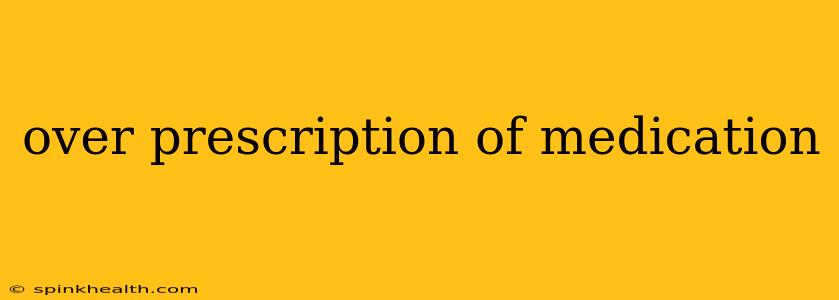The quiet hum of the doctor's office, the reassuring pat on the shoulder, the prescription slip – these are familiar scenes for millions. But what happens when that familiar comfort becomes a slippery slope? This isn't a condemnation of doctors or the crucial role of medication, but rather an exploration of the alarming rise of medication overprescription and its devastating consequences. This isn't just about numbers; it's about the very real human stories behind the statistics.
Imagine Sarah, a young mother battling anxiety. Her doctor prescribes medication, and initially, it's a lifeline. She feels capable, she functions, she's a better mother. But over time, the initial relief fades, and the dosage increases. She's caught in a cycle of dependence, a cycle she never intended. This is a common narrative, illustrating the complex reality of overprescription.
What is Considered Medication Overprescription?
Medication overprescription occurs when a patient receives more medication than clinically necessary, either in terms of dosage, frequency, or duration. This can manifest in several ways:
- Too high a dose: A patient receives a higher dose than their body needs or can tolerate, leading to adverse effects.
- Too long a duration: Medication is prescribed for a longer period than required, increasing the risk of side effects and dependency.
- Multiple prescriptions for similar conditions: A patient receives several medications targeting the same condition, increasing the likelihood of drug interactions and complications.
- Prescribing for inappropriate conditions: A medication is prescribed for a condition it isn't intended to treat.
What are the Risks of Overprescription?
The consequences of overprescription can be profound, ranging from mild discomfort to life-threatening complications. Let's look at some key risks:
- Adverse drug reactions (ADRs): Overmedication significantly increases the risk of experiencing unpleasant or dangerous side effects, which can range from mild nausea to severe organ damage.
- Drug interactions: Taking multiple medications simultaneously increases the chance of harmful interactions, potentially nullifying the effects of one drug or creating new problems.
- Addiction and dependence: Certain medications can be addictive, and prolonged or excessive use can lead to physical and psychological dependence.
- Increased healthcare costs: Overprescription leads to increased medical expenses, both from the cost of the medication itself and from the treatment of resulting complications.
- Reduced quality of life: Side effects and complications associated with overprescription can significantly impair a person's physical and mental well-being.
Why Does Overprescription Happen?
Overprescription isn't always intentional malice; it's a multifaceted problem stemming from several factors:
- Pressure from patients: Some patients might pressure their doctors to prescribe medication, expecting a quick fix for their problems.
- Lack of time and resources: Doctors often face time constraints and limited resources, potentially leading to rushed decisions and less thorough assessments.
- Insufficient communication: Poor communication between doctors and patients can lead to misunderstandings and inappropriate prescribing practices.
- Financial incentives: In some cases, financial incentives might indirectly influence prescribing habits.
- Lack of awareness of alternative treatments: Focusing solely on pharmaceutical solutions might overshadow alternative treatments like lifestyle changes or therapy.
How Can We Combat Medication Overprescription?
Tackling this complex issue requires a multi-pronged approach:
- Improved patient-doctor communication: Open and honest conversations between patients and doctors are crucial. Patients need to be fully informed about the risks and benefits of medication, and doctors need to actively listen to patient concerns and explore alternative treatments.
- Enhanced medical training: Comprehensive training on responsible prescribing practices, including the recognition and management of addiction risks, is crucial for healthcare professionals.
- Increased focus on non-pharmaceutical treatments: Promoting alternative therapies such as lifestyle changes, therapy, and other non-pharmacological interventions can reduce reliance on medication.
- Improved monitoring and regulation: Robust monitoring systems and stricter regulations can help identify and address patterns of overprescription.
- Patient empowerment: Empowering patients to take an active role in their healthcare decisions, including seeking second opinions and actively participating in treatment plans, is vital.
What are some alternative treatments to medication?
This depends heavily on the specific condition. However, options can include:
- Therapy: Cognitive Behavioral Therapy (CBT) and other therapies can be highly effective for managing anxiety, depression, and other mental health conditions.
- Lifestyle changes: Regular exercise, a balanced diet, and sufficient sleep can significantly improve overall health and reduce the need for medication.
- Alternative medicine: Some individuals find relief through practices like acupuncture, yoga, or meditation. However, it's crucial to discuss these with a doctor before making any changes to your treatment plan.
This complex issue demands a nuanced understanding. It's not about villainizing doctors or demonizing medication, but rather fostering a system where both patients and healthcare professionals work collaboratively, prioritizing informed decisions and responsible care. The journey towards healthier practices requires a collective effort to ensure that the healing process doesn't become a source of harm.

